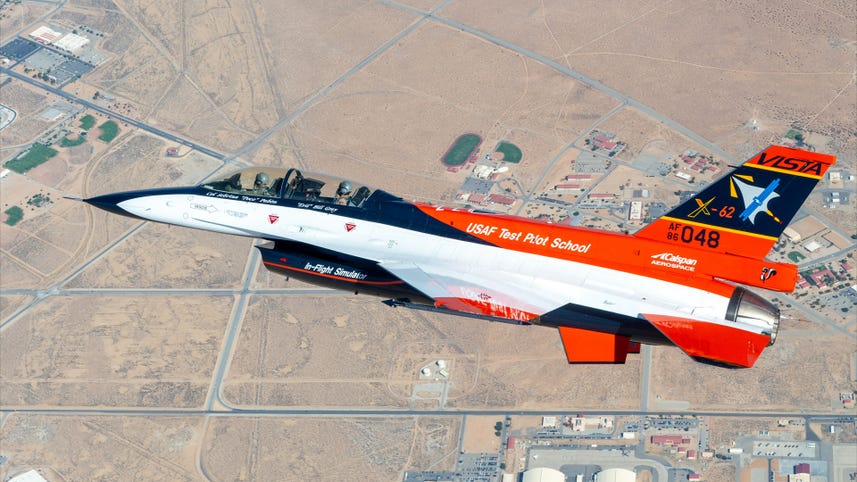
Speaker 1: Imagine a fighter jet engaged in combat, executing advanced dog fighting maneuvers with no pilot on board. In fact, it's under no human control at all. The jet is being flown by an advanced ai.
Speaker 1: This is a very special one-of-a-kind aircraft called the X 62 A Vista. And back in December, researchers for DARPA and the US Air Force put it through a series of tests to see if artificial [00:00:30] intelligence could complete different tasks. The jet flew 12 flights from Edwards Air Force Base in California under AI control, totaling 17 hours of flight time. During these test flights, the AI was tasked with putting the jet through advanced fighter maneuvers and dog fighting. This wasn't just one specific artificial intelligence At any given time, the Vista was under the control of four different AI algorithms, depending on the mission parameters. So how did it go? Well, [00:01:00] in a statement, an Air Force scientist said the X 62. A Vista team has proven that they are capable of complex AI test missions, and DARPA says the team didn't run into any major issues, but did encounter some differences compared to simulation-based results. These flights were several years in the making. Back in 2020, DARPA ran an event called the Alpha Dog Flight Trials. Think of this like a top gun style competition [00:01:30] without real jets. It all happened in computer simulations. The goal was to learn how different AI algorithms would handle dog fights. In the end, the top performing AI flew against a real human pilot who was flying a simulated F 16, and that AI won pretty convincingly, five to zero in fact.
Speaker 1: Now this of course, isn't the first time we've seen aircraft fly themselves. In fact, the ideas almost [00:02:00] unremarkable these days. DARPA has used AI to fly several simulated missions on this modified Blackhawk helicopter. In this case, there wasn't even a human pilot on board, and I've experienced self-flying tech myself. Last fall, I took a ride in X-Wing self-flying Cessna with a safety pilot on board, just in case. X-Wing aircraft is controlled by the company's own AI called Super Pilot, which flies its missions following predetermined waypoints and can make adjustments as needed. But teaching [00:02:30] an AI to engage in air combat, that's something completely different. Which brings us to this week's what the feature. Let's take a look at the X 62 Vista and why this was the perfect aircraft for these tests.
Speaker 1: This is an experimental aircraft designed by Lockheed Martin's Skunkworks division. It's been in service since 1992, though it's based on an F 16. It has special software that allows it to mimic performance [00:03:00] characteristics of different aircraft. So the Air Force Test Pilot School can use it to train its pilots on various conditions while simulating different jets, and it can be used to test prototype hardware and software. So in the case of the recent AI tests, the X 62 was acting like an F 16, but it could, for example, simulate the flying patterns of an unmanned military aircraft like this MQ 20 Avenger.
Speaker 1: So does this mean an inevitable grounding of fighter [00:03:30] pilots as we know them? Well, probably not anytime soon. There's still a long way to go before these types of algorithms are proven to be reliable enough to deploy in combat. The most likely scenario is that unmanned aircraft will fly alongside piloted aircraft. Much like Boeing Australia's loyal Wingman Drone is designed to do. I covered that aircraft when it made its maiden flight last year. Click the link on your screen to see it. So what do you think of the idea of Pilotless fighter jets? Let us know in the comments below. If you enjoy this video, please give it a thumbs up [00:04:00] and subscribe to CNET for more with the future.